THE COURTS
Title 249--PHILADELPHIA RULES
PHILADELPHIA COUNTY
Adoption of Philadelphia Traffic Court Local Rules Nos. 106, 120, 121, 454, 1030, 1031, 1032, 1033 and 1035; Administrative Order 02 of 2005
[35 Pa.B. 6991]
Order And Now, this 21st day of December, 2005, pursuant to Pa.R.Crim.P. 105 and Pa.R.Crim.P. 1030 et seq., Philadelphia Traffic Court Local Rule Nos. 106, 120, 121, 454, 1030, 1031, 1032, 1033 and 1035, which follow this order, are adopted, and shall become effective on February 1, 2006.
The original Administrative Order shall be filed with the Prothonotary in a docket maintained for Administrative Orders issued by the Administrative Judge of the Philadelphia Traffic Court, and copies shall be submitted to the Administrative Office of Pennsylvania Courts, the Legislative Reference Bureau, the Criminal Procedures Rules Committee, and the Minor Court Rules Committee. Copies of the Order shall also be submitted to American Lawyer Media, The Legal Intelligencer, Jenkins Memorial Law Library, and the Law Library for the First Judicial District of Pennsylvania.
By the Court
BERNICE DEANGELIS,
Administrative Judge
Traffic Court
Philadelphia Traffic Court Local Rules Local Rule 1030. Scope of Summary Traffic Court Rules.
The local rules that follow complement Chapter 10, Part B. of the Pennsylvania Rules of Criminal Procedures, Philadelphia Traffic Court Rules, Pa.R.Crim. P. 1030 et seq., and the rules referenced thereto, and are intended to identify for counsel and unrepresented parties the procedural rules applicable to Traffic Court proceedings in Philadelphia County. These rules are referenced herein as ''Local Rules'' and shall be cited as ''Phila.T.C.L.R. ____ .''
Local Rule 106. Continuance Policy
(a) General Rule. All continuance requests shall:
(1) be in writing, on a court-approved form, (see form which follows this Local Rule) reference the citation number and the defendant's driver license number;
(2) identify the date, time, and, if applicable, the courtroom it is listed for; and
(3) specifically state the reasons for the request.
Documentation substantiating the request for the continuance (i.e. proof of necessary hospitalization, pre-paid vacation, military service, etc.) must be submitted.
(b) Timing of request. All requests for continuance must be received by the Philadelphia Traffic Court at least 48 hours before the date set for the trial or hearing. A later request shall only be granted if the defendant or defendant's attorney of record establishes that the cause for the continuance request did not previously exist, or that the defendant was not aware of the grounds for the request, or the interests of justice require it.
(c) Address Where Continuance Requests are to Be Mailed or Delivered. All requests for continuances are to be mailed or delivered to the Philadelphia Traffic Court, 800 Spring Garden, Philadelphia, PA 19123. All requests for continuances shall be assigned to the Administrative Judge or his/her designee who shall rule on the request, in writing, and shall state the reasons for the grant or denial of the continuance.
(d) Requests For Continuance on the Trial Date. All requests for continuances on the day of the summary trial or hearing shall be in writing, on the court-approved form, and shall be presented to the presiding judge. All such requests shall be denied unless the defendant or the defendant's attorney of record establishes that the cause for the continuance request did not previously exist, or that the defendant was not aware of the grounds for the request, or the interests of justice require it. The presiding judge shall rule on the request, in writing, and shall state the reasons for the grant or denial of the continuance.
Comment: Continuance requests must be made timely to enable the Court to review and properly rule on them. The Court may entertain written requests from unrepresented parties if not made on the court-approved form as long as the required information is provided. Documentations ought to be provided as necessary. Continuance requests may be disposed administratively.
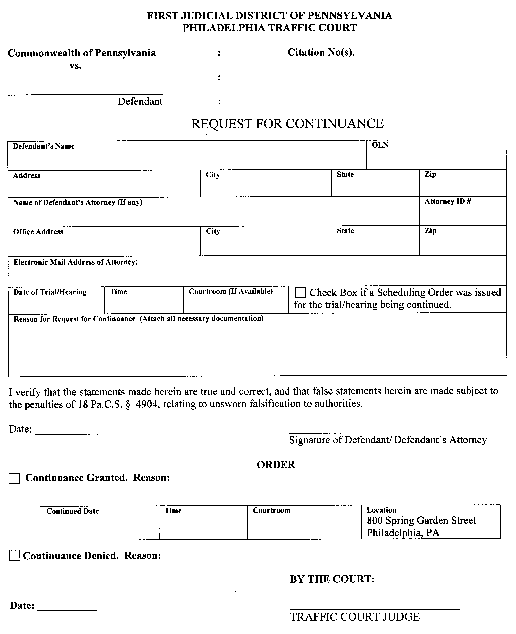
Local Rule 120. Attorneys--Appearances and Withdrawals
(a) Entry of Appearance.
(1) Counsel for defendant shall file with the Attorney Filing Unit an entry of appearance, (see form which follows this Local Rule), identifying the citations for which counsel has been retained. The entry of appearance shall include the attorney's office address and electronic mail address, phone number, and the Supreme Court attorney identification number. An entry of appearance seeking to limit representation to a specific hearing shall not be accepted.
(2) When counsel is appointed pursuant to Pa.R.Crim. P. 1035, Appointment of Counsel, the filing of the appointment order shall enter the appearance of appointed counsel.
(3) Counsel shall not be provided any defendant information unless an Entry of Appearance is filed with the Attorney Filing Unit.
(4) An attorney who has been retained by a defendant and entered an appearance as provided in this rule shall continue such representation in the Traffic Court until granted leave to withdraw by the court pursuant to paragraph (b). An attorney who has been appointed by the court pursuant to Pa.R.Crim. P. 1035 shall continue representation as provided in Local Rule 1035.
(b) Withdrawal of Appearance. Counsel for a defendant may not withdraw his or her appearance except by leave of court. The request shall be in writing (see form which follows this Local Rule), or may be made orally in open court in the presence of the defendant. The Court may grant the request to withdraw when new counsel enters an appearance, when new counsel is appointed to represent the defendant, or when the defendant intelligently waives the right to counsel.
Comment: The entry of appearance process has been problematic in Traffic Court proceedings. This Local Rule is designed to advise all parties that counsel must enter an appearance as a precondition to representation of Traffic Court defendants. Traffic Court will not provide defendant information to counsel until an entry of appearance is filed. Counsel is not permitted to enter an appearance for a limited purpose--i.e. representation for a warrant hearing, or impoundment hearing and the like. Rather, counsel must enter an appearance in connection with all proceedings in the Traffic Court and must officially withdraw from the case to be relieved of further legal obligations at the Traffic Court level.
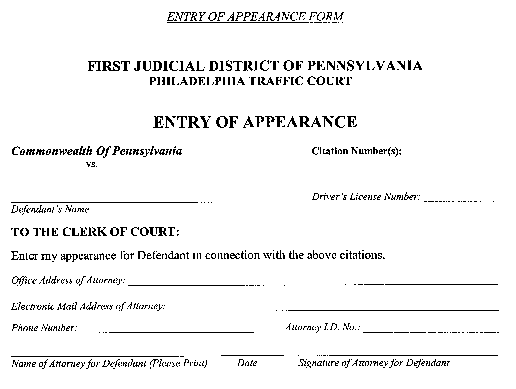
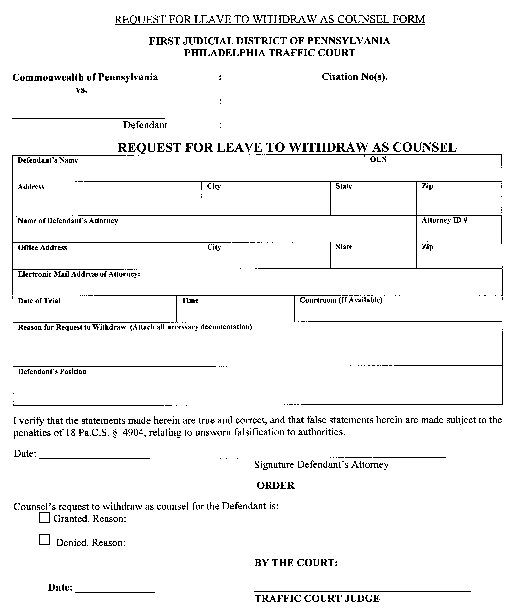
Local Rule 121. Waiver of Counsel.
The Waiver of Counsel Form executed by a defendant pursuant to Pa.R.Crim.P. 121 shall be as follows:
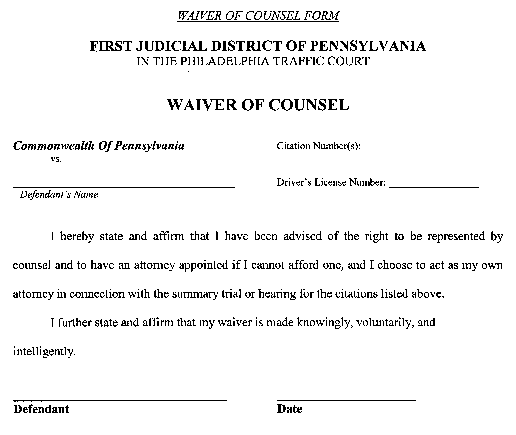
Local Rule 454. Trial in Summary Cases. Role of the affiant. Sentencing orders.
(a) Summary Trial. The Traffic Court judge shall conduct the summary trial as provided by Pa.R.Crim.P. 454. At the conclusion of the summary trial, the judge shall sign the docket of the Traffic Court, identifying the disposition and the amount of the fine and costs imposed, if any. No facsimile signature may be used to sign the docket of the Traffic Court.
(b) Evidence. Representative or Designee of the Issuing Law Enforcement Officer or Agency.
(1) The law enforcement officer who issued or filed the citation (the ''affiant'') need not appear for the summary trial. The allegations in the citation may be recited on behalf of the issuing law enforcement officer, and that individual is authorized to ask questions of any witness who testifies.
(2) In addition to any law enforcement officer, any authorized user of the Pennsylvania Justice Network (''JNET''), may produce and offer to the Court a defendant's certified driving record, as necessary.
(3) At any time before the completion of the summary trial or acceptance of a guilty plea, the representative or designee of the issuing law enforcement officer or agency may request in open court the Traffic Court judge for permission to withdraw one or more of the charges pursuant to Pa.R.Crim.P. 457. If the Traffic Court judge authorizes the withdrawal of one or more of the charges, the Traffic Court judge shall record such withdrawal(s) on the docket of the Traffic Court.
(4) The representative or designee of the issuing law enforcement officer or agency may engage in plea bargaining with the defendant; however, all plea bargains are subject to the approval of the assigned Traffic Court judge in open court.
(c) Sentencing Orders. Every defendant shall be given a copy of the written order imposing sentence issued as required by Pa.R.Crim.P. 454(E). The Traffic Court judges shall use sentencing orders substantially in the form set forth below whenever a period of incarceration is entered as part of a sentence.
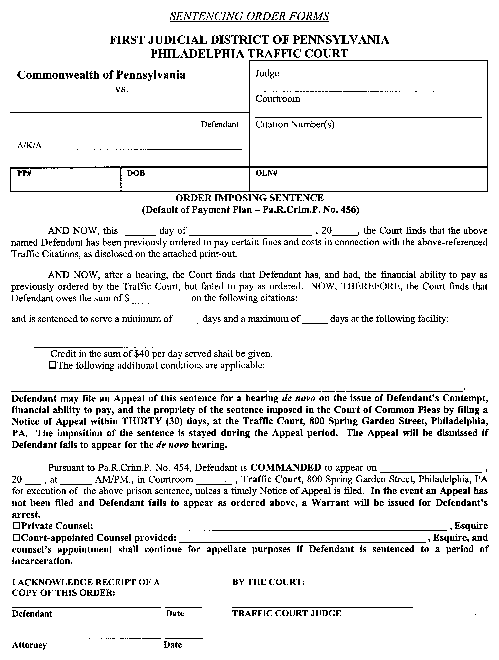
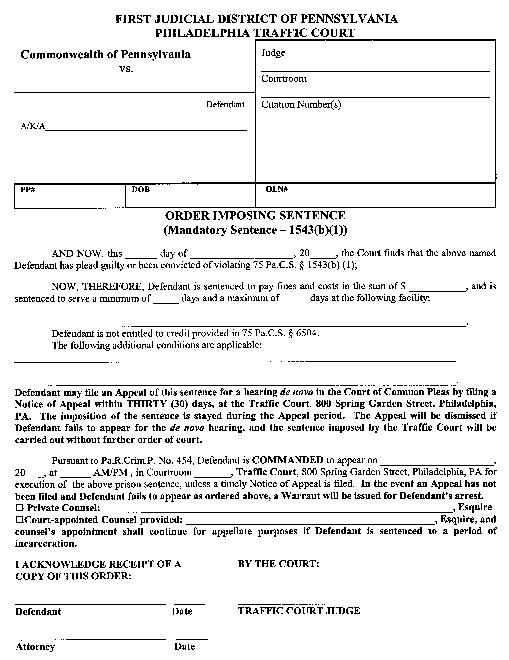
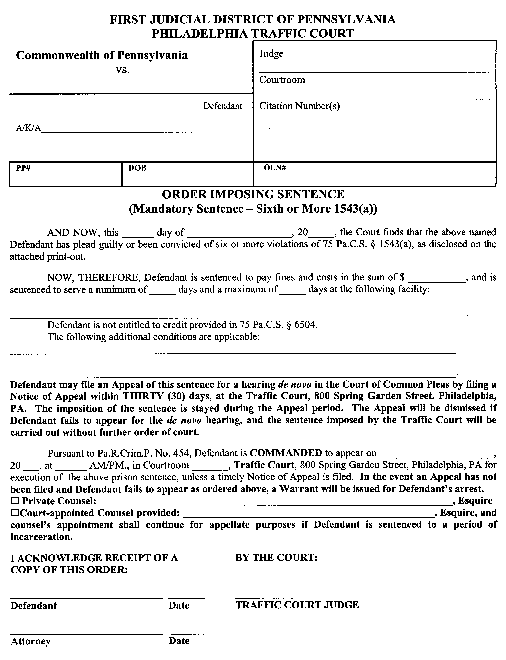
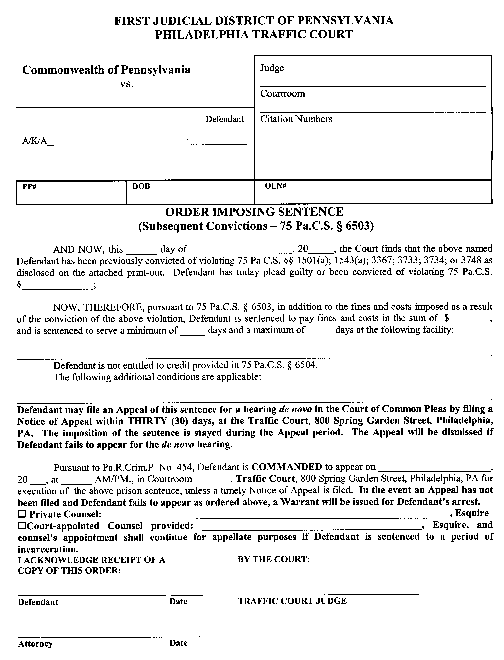
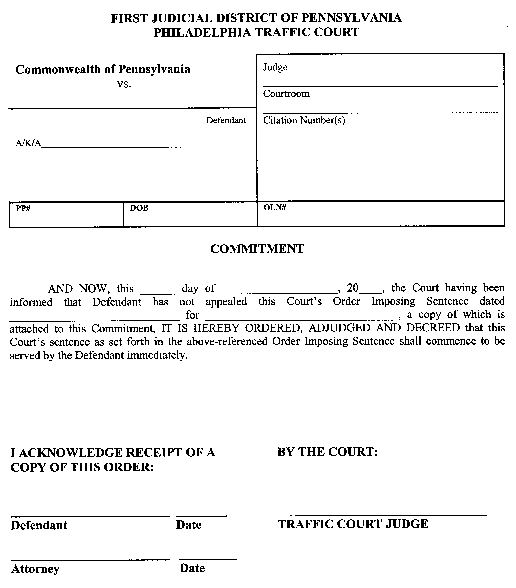
[Continued on next Web Page]
No part of the information on this site may be reproduced for profit or sold for profit.This material has been drawn directly from the official Pennsylvania Bulletin full text database. Due to the limitations of HTML or differences in display capabilities of different browsers, this version may differ slightly from the official printed version.